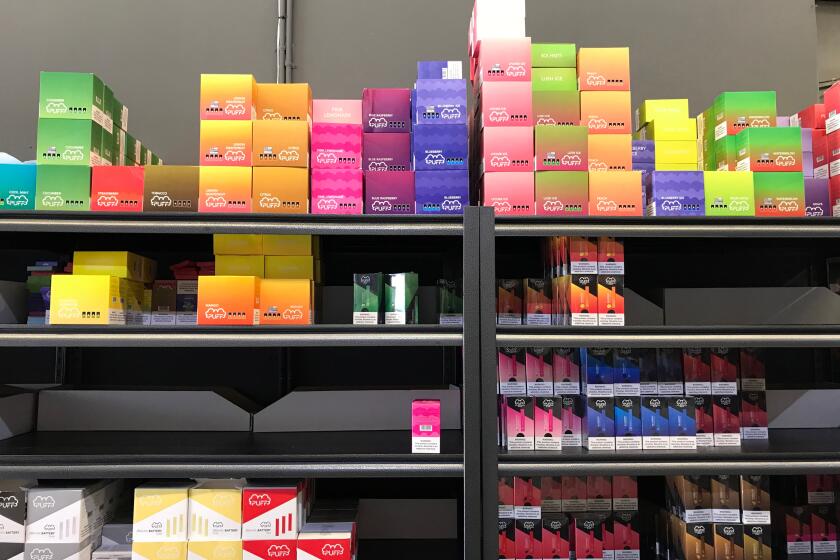California banned the sales of flavored tobacco products, but researchers say online sales have boomed

- Share via
Despite California’s efforts to stop the sale of flavored tobacco products, UC San Diego researchers say consumers have discovered a loophole: online shopping.
In 2022, Senate Bill 793 went into effect, prohibiting the sale of flavored tobacco products — making California the second state in the U.S. after Massachusetts to pass the broad law.
For the record:
4:55 p.m. Nov. 12, 2023An earlier version of this article said the researchers are from the University of San Diego. They are UC San Diego researchers.
The bill was prompted by the growing sales of an assortment of “kid-friendly flavors” such as cotton candy and bubble gum as well as the high rates of teen use of e-cigarettes.
E-cigarettes are still considered a relatively new product — sold in the U.S. for about a decade — so their impact on health is still being researched, according to the American Lung Assn. However, in 2018 the National Academies of Sciences, Engineering and Medicine reported that e-cigarettes can cause health problems, including a risk for coughing, wheezing and an increase in asthma in youths. It was also found that e-cigarettes contain a number of dangerous chemicals including acetaldehyde, acrolein and formaldehyde. These aldehydes can cause lung disease and heart disease.
In 2022, the Food and Drug Administration reported that e-cigarette use among youths as its top concern. In its 2022 National Youth Tobacco Survey, the agency found that more than 2.5 million U.S. middle and high school students used e-cigarettes. The same data found that e-cigarette users preferred flavored products, with fruit flavors being the most popular, followed by candy, desserts or other flavors.
The Supreme Court clears the way for California to enforce a ban on the sale of most flavored tobacco products, including menthol cigarettes.
The most recent version of that national survey reported that 2.1 million youths use e-cigarettes, with a decline in high school students using the product.
Several California counties, including Los Angeles, San Francisco and Sacramento, adopted local bans on flavored tobacco long before the statewide law took effect.
But state and local efforts haven’t stopped consumers from getting their hands on tobacco-related products such as e-cigarettes.
Researchers at the Herbert Wertheim School of Public Health and Human Longevity Science at UC San Diego found that online shopping for cigarettes and vaping products increased significantly in the weeks after the implementation of Senate Bill 793.
The law says tobacco retailers cannot sell flavored products, but it doesn’t specifically define e-commerce businesses as retailers.
The driver appeared to crash into the front entrance at the tobacco shop and then roll down her window to survey the damage.
Researchers collected weekly Google search rates related to online shopping for cigarettes and vaping products in California from January 2018 to May 2023, and identified websites marketing flavored vaping and menthol products, according to the report.
They found that shopping queries were 194% higher than expected for cigarettes and 162% higher than expected for vaping products after the Senate bill was adopted.
Eric Leas, assistant professor of the School of Public Health and Human Longevity Science and director of the tobacco e-commerce lab, said retailer licensing programs have proved to be effective in enforcing tobacco control laws.
“However, the exclusion of e-commerce retailers from these programs can undermine their impact,” Leas said.
“The absence of explicit regulations on e-commerce sales can create loopholes in enforcing tobacco control laws, allowing consumers to easily access restricted products online,” he said.
Researchers are recommending that e-commerce businesses be included in the definition of tobacco retailer within existing and future tobacco control policies as well as monitoring online compliance.
More to Read
Sign up for Essential California
The most important California stories and recommendations in your inbox every morning.
You may occasionally receive promotional content from the Los Angeles Times.













